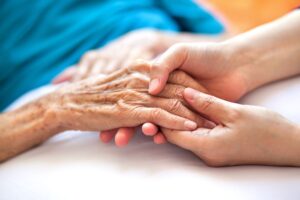
In late March 2022, New York Governor Kathy Hochul issued executive order 47 decreeing that “[t]he suspensions contained in Executive Order 4.4 of Subdivision 3 of Section 2895-b of the Public Health Law and Subdivision 1 of Section 2828 of the Public Health Law shall no longer be in effect.”
Subdivision 3 of Section 2895-b of Public Health Law (Minimum Staffing Requirements)
N.Y. Public Health Law § 2895-b(3)(a) set forth a new minimum standard for staffing hours in nursing homes. As enacted, the law requires that nursing homes “maintain daily average staffing hours equal to 3.5 hours of care per resident per day by a certified nurse aide, a licensed nurse or a nurse aide; provided that out of such 3.5 hours, no less than 2.2 hours of care per resident per day shall be provided by a certified nurse aide or a nurse aide, and no less than 1.1 hours of care per resident per day shall be provided by a licensed nurse.”
Subdivision 1 of Section 2828 of Public Health Law (Minimum Spending Requirements)
N.Y. Public Health Law § 2828 requires that “every residential health care facility shall spend a minimum of seventy percent of revenue on direct resident care, and forty percent of revenue shall be spent on resident-facing staffing, provided that amounts spent on resident-facing staffing shall be included as a part of amounts spent on direct resident care.” In other words, all nursing homes must devote at least 70% of revenue to direct resident care, and 40% of that revenue must be allocated to resident-facing staffing.
Section 2828 provides that nursing homes can deduct at least fifteen percent of the cost of the amount spent on staffing that is contracted out for services provided by registered professional nurses, licensed practical nurses, or certified nurse aides from staffing requirements.
The new law also requires that nursing home revenue not exceed its operating and non-operating expenses by 5%. If a nursing home does exceed the revenue requirement, it will be required to remit the overage to the state.
Section 2828 does not apply to “facilities that are authorized by the department to primarily care for medically fragile children, people with HIV/AIDS, persons requiring behavioral intervention, persons requiring neurodegenerative services, and other specialized populations that the commissioner deems appropriate to exclude; and (b) continuing care retirement communities licensed pursuant to article forty-six or forty six-a of this chapter.”
Long-Term Care Community Coalition (LTCCC) executive director, Richard Mollot recently released a statement expressing gratitude to the governor for “standing up on behalf of New Yorkers, who have a right to expect that nursing homes will fulfill their promise to seniors and families.” Mollot also commented that “The time has come to stop accepting the industry’s false and indecent narrative that it cannot afford to provide sufficient staffing. As the industry’s recent lawsuit divulged, nursing homes have hundreds of millions of extra dollars floating around that can be used to provide decent working conditions for staff and living conditions for residents.”
Under a prior executive order, a nursing home’s failure to meet the daily average staffing hours was not to be held a violation of the state Public Law. Also, the failure of a residential health care facility to spend a minimum of seventy percent of revenue on direct resident care, and forty percent of revenue on resident-facing staffing, was not held to be a violation of the Public Health Law.
Under executive order 4.7, these suspensions are no longer in effect, and nursing care facilities must now comply with the current staffing and revenue requirements.
Contact an Experienced Nursing Home Injury Attorney
The reinstatement of these nursing home reform laws is a positive development and a step in the right direction. However, the fact remains that you or your loved one may be at risk of neglect due to improper practices or understaffing.
If your loved one has been injured due to nursing home negligence, you should schedule a free consultation with the experienced attorneys at Bonina & Bonina, P.C. Call us at 1888-MEDLAW1 or contact us online for a free consultation. We have experience helping clients with nursing home negligence cases, and we can explain your options and help you decide what actions you should take. At Bonina & Bonina, P.C., we come to work every day believing that there should be equal justice for all. Se Habla Espaňol. Home and hospital visits are available.
